The university-level final defense for the 37th Challenge Cup Science and Technology Competition at Tsinghua University took place on April 13, 2019. After the letter review and defense sessions, four teams from the DME were awarded prizes. The team led by Yu Chang secured the top prize, the Wang Chenzi team received the second prize, while both the Yi Xili team and Zhang Xuanhe team secured the third prize.
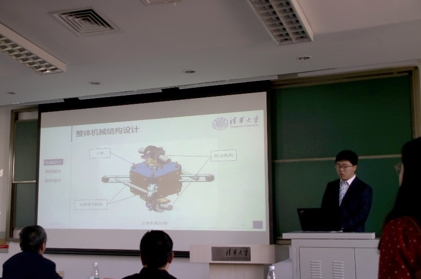
Panel judging for Challenge Cup
The work of Yu Chang’s team, the “Integrated Bar-type Pipeline Robot with Adaptability to Complex Pipelines”, secured the top prize in the “Challenge Cup”. The innovative design of the robot, featuring adaptable driving wheels, enables it to navigate various challenges presented by bends, tees, and vertical pipes in urban areas. Additionally, it can rotate and even spiral forward through curves, making it an effective vehicle for pipeline detection and repair. The official microblog of Tsinghua University also reported on this work.
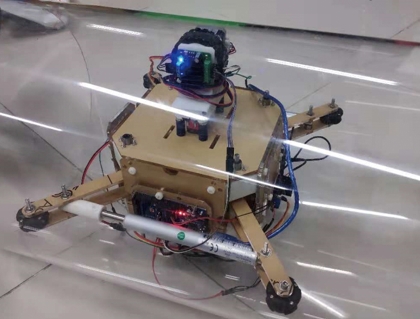
Pipeline robot developed by Yu Chang’s team
Wang Chenzi’s team was awarded the second prize for their project titled “Intelligent Football Based on Inertial Measurement and Motion Modal Analysis”. They integrated sensors and microprocessors into the football and subsequently analyzed the collected data through an external upper computer. This system enables the acquisition of the football’s trajectory in three-dimensional space, offering valuable data support for the training of football players and enthusiasts.
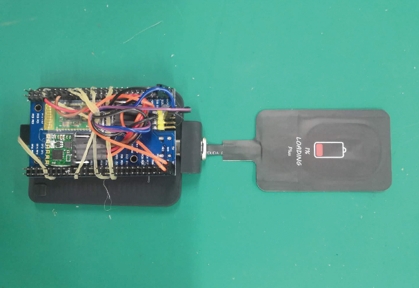
Intelligent module within the intelligent football
The “Self-Adaptive Internal Derailleur for Bicycles”, a project developed by Yi Xili’s team, secured the third prize. This project allows for self-adaptive speed changes by automatically adjusting the transmission ratio of the derailleur through a flexible connection of the transmission system, cam mechanism, and ratchet mechanism.
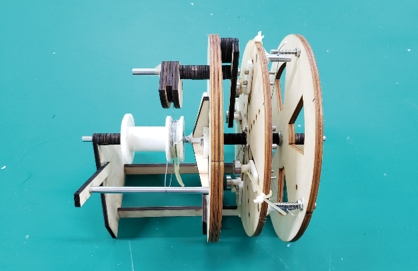
Principle model demonstrating the functionality of the self-adaptive internal derailleur for bicycles
Zhang Xuanhe’s team was awarded the third prize for their project titled “Surface Modification of Sand Particles Based on Colloidal Self-Assembly and Demulsification Application”. The study focused on modifying the surface of sand, making a substantial portion hydrophobic. The remaining non-hydrophobic surface was employed to absorb water and facilitate the separation of oil from water in emulsions.
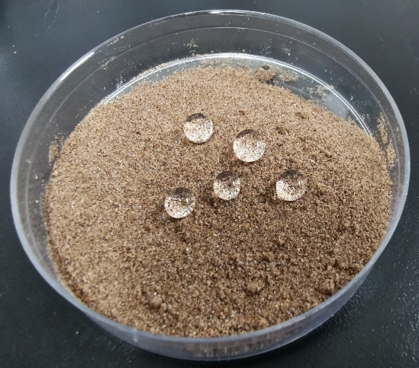
Effect after sand surface modification
The remarkable achievements attained by the DME in the “Challenge Cup” Science and Technology Competition are a testament to the hard work of DME students. These accomplishments would not have been possible without the diligent instruction of the DME faculty and the strong support from the departmental leadership. In this regard, we extend our heartfelt thanks to them! The DME encourages its students to uphold and advance the department’s outstanding tradition in scientific and technological innovation and strive for further success!
The awards earned by DME students in this year’s “Challenge Cup”:
Contestant |
Award-winning Work |
Award |
Yu Chang, Sun Yangchang, Xiang Yunwei |
Integrated Bar-type Pipeline Robot with Adaptability to Complex Pipelines |
Top Prize |
Wang Chenzi, Sang Jinnan, Hong Haoyun |
Intelligent Football Based on Inertial Measurement and Motion Modal Analysis |
Second Prize |
Yi Xili, Yu Zongze, Du Boyuan |
Self-Adaptive Internal Derailleur for Bicycles |
Third Prize |
Zhang Xuanhe, Gan Wenzhuo, Li Zhaoxin |
Surface Modification of Sand Particles Based on Colloidal Self-Assembly and Demulsification Application |
Third Prize |







